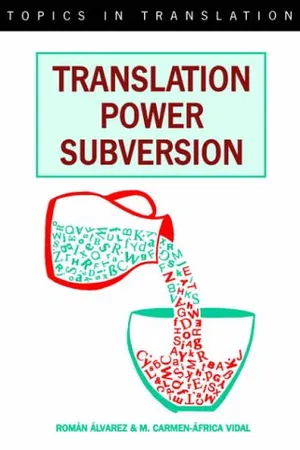
- 164 pages
- English
- PDF
- Available on iOS & Android
eBook - PDF
Translation, Power, Subversion
About this book
During the latter half of this century, particular attention has been paid to translating. The progress and change of perspective in this field of knowledge have been spectacular, moving from a scientific and prescriptive vision of translation to a descriptive one, which, in turn, has given way to the interaction between translation and culture. The starting point of this book is the idea that language is not neutral and that, insofar as language is the translator's tool, the act of translating is not neutral either. Translation shapes the way in which a given society receives a work, an author, a literature, or a culture; therefore it is necessary to locate the subversive aspects of translations in the larger framework of social interaction. Translating can never be neutral, as it is charged with ideology and 'games of power'. The most attractive feature of this anthology is that in the essays we can see how norms vary from one culture to another, how a 'strong' society may wish to alter those of a 'weaker' one through translation, or how the canon can be modified. Translation as a political or manipulative action will be much less dangerous if we are aware of its consequences. This book will help us to reflect on this problem.
Tools to learn more effectively

Saving Books

Keyword Search

Annotating Text

Listen to it instead
Information
Table of contents
- Contents
- Acknowledgements
- 1 Translating: A Political Act
- 2 The Meek or the Mighty: Reappraising the Role of the Translator
- 3 Norms and the Determination of Translation: A Theoretical Framework
- 4 Culture-specific Items in Translation
- 5 The Exotic Space of Cultural Translation
- 6 Translation and Pragmatics
- 7 Translation, Counter-Culture, and The Fifties in the USA
- 8 Translation and Canon Formation: Nine Decades of Drama in the United States
- Notes on Contributors
Frequently asked questions
Yes, you can cancel anytime from the Subscription tab in your account settings on the Perlego website. Your subscription will stay active until the end of your current billing period. Learn how to cancel your subscription
No, books cannot be downloaded as external files, such as PDFs, for use outside of Perlego. However, you can download books within the Perlego app for offline reading on mobile or tablet. Learn how to download books offline
Perlego offers two plans: Essential and Complete
- Essential is ideal for learners and professionals who enjoy exploring a wide range of subjects. Access the Essential Library with 800,000+ trusted titles and best-sellers across business, personal growth, and the humanities. Includes unlimited reading time and Standard Read Aloud voice.
- Complete: Perfect for advanced learners and researchers needing full, unrestricted access. Unlock 1.4M+ books across hundreds of subjects, including academic and specialized titles. The Complete Plan also includes advanced features like Premium Read Aloud and Research Assistant.
We are an online textbook subscription service, where you can get access to an entire online library for less than the price of a single book per month. With over 1 million books across 990+ topics, we’ve got you covered! Learn about our mission
Look out for the read-aloud symbol on your next book to see if you can listen to it. The read-aloud tool reads text aloud for you, highlighting the text as it is being read. You can pause it, speed it up and slow it down. Learn more about Read Aloud
Yes! You can use the Perlego app on both iOS and Android devices to read anytime, anywhere — even offline. Perfect for commutes or when you’re on the go.
Please note we cannot support devices running on iOS 13 and Android 7 or earlier. Learn more about using the app
Please note we cannot support devices running on iOS 13 and Android 7 or earlier. Learn more about using the app
Yes, you can access Translation, Power, Subversion by Roman Alvarez,M. Carmen-Africa Vidal in PDF and/or ePUB format, as well as other popular books in Languages & Linguistics & Translating & Interpreting. We have over one million books available in our catalogue for you to explore.